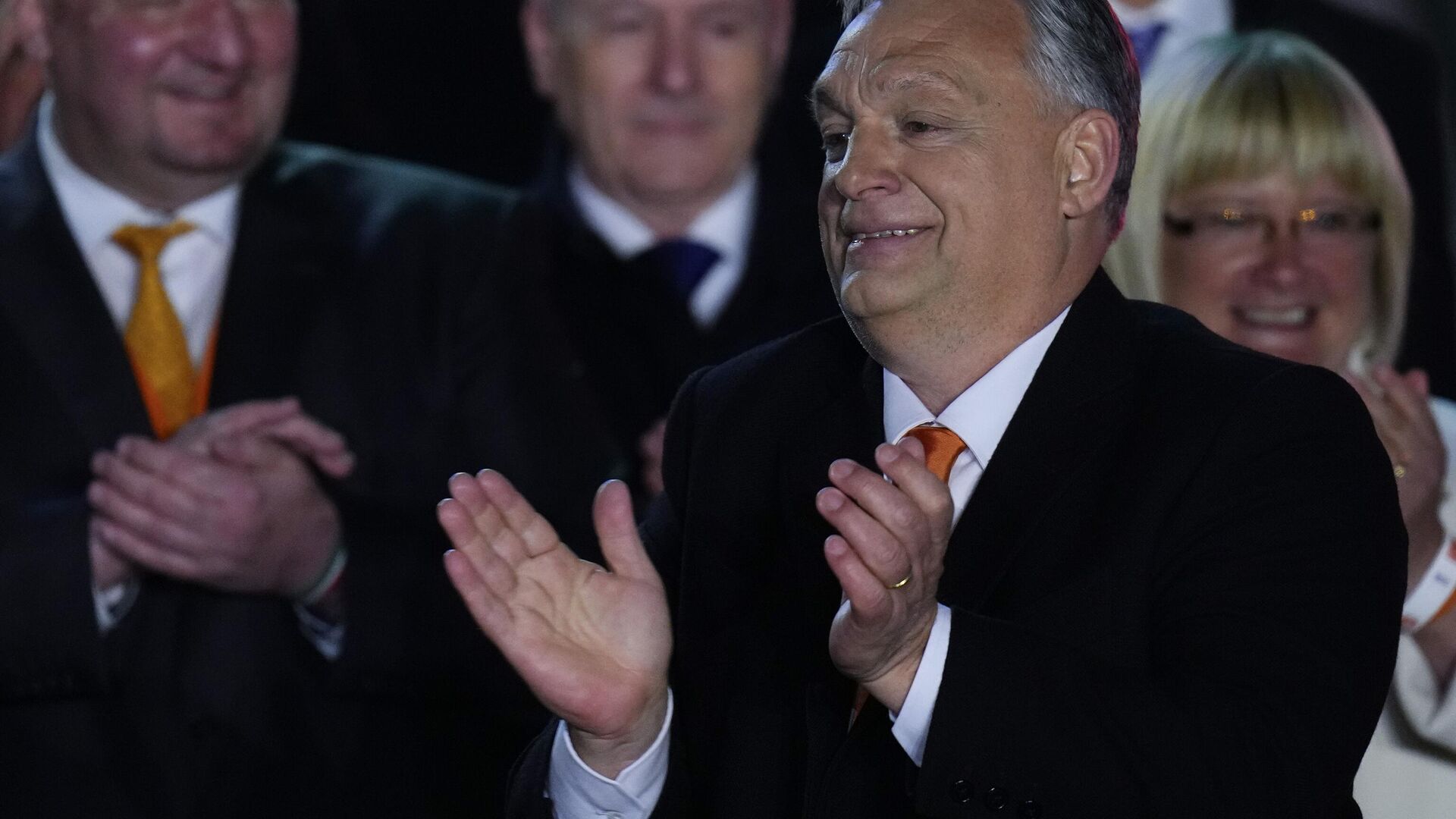Hungarian Prime Minister Viktor Orbán Declares 'Great Victory' in General Election
21:04 GMT 03.04.2022 (Updated: 22:29 GMT 03.04.2022)

© AP Photo / Petr David Josek
Subscribe
Hungarian Prime Minister Viktor Orbán was projected to win a fourth consecutive term on Sunday as polls showed that the ruling Fidesz party and its junior party, the Hungarian Christian Democrats, were on track to retain its two-thirds supermajority by winning 133 seats in the 199-member parliament.
With more than 36.3% of votes counted, Viktor Orbán, Hungary's sitting prime minister, has declared an early victory in the country's general election.
Orbán's projected victory comes alongside polls showing that the ruling conservative government and its junior party will likely retain the parliament supermajority that has allowed the country to become an "illiberal democracy" during the prime minister's 12-year reign.
"Dear friends, this victory will also remain unforgettable for the rest of our lives," Orbán said, "because there were a lot of those that we needed to fight against: the ‘left’ at home, the ‘international left’ abroad, the Brussels bureaucrats, all the financial institutions of the Soros empire, the international media, and actually even the Ukrainian president."
Early reports show that support for the right-wing nationalist party is stronger than it was four years ago in Hungary's 106 individual constituencies.
Strana Fidesz získala ústavní většinu, je ještě silnější než před čtyřmi lety. Viktor Orbán děkuje příznivcům. @iROZHLAScz @Radiozurnal1 @CRoPlus pic.twitter.com/YKbyCKa1Jf
— Pavlína Nečásková (@PavlnaNeskov) April 3, 2022
Péter Márki-Zay, leader of the United for Hungary opposition bloc, acknowledged defeat in the general election shortly after the prime minister claimed victory.
Márki-Zay, who ran and won the 2018 mayoral election in Hódmezővásárhely, was unable to secure enough support in his own Hódmezővásárhely-Makó district. With more than 98% of votes counted, 52.24% supported Orbán, while only 39.71% backed the opposition leader.
"The truth is that Fidesz won this election ... I ask everyone to calm down, go home, love each other and get enough sleep," Márki-Zay told supporters after publicly accepting defeat. "The most important thing is that we are pure in soul, we are now standing not only before the Hungarian nation, but, more importantly, before God."
Both prime ministerial candidates addressed voters after casting their own ballots in the election.
According to the incumbent prime minister, the gravity of Sunday's election was major due to both the inclement weather and the ongoing Russia-Ukraine conflict. He asserted that while the conservative Fidesz and its junior party were on the side of peace, the opposition would likely roll back nationalist policies and make decisions that would likely lead the country into war.
"Vladimir Putin is not running in the elections," the prime minister told reporters when asked for his thoughts on the conflict in nearby Ukraine.
Orbán similarly quipped that Ukrainian President Volodymyr Zelensky would not be casting his ballot in Sunday's election.
During his own address, Márki-Zay attempted to rally young voters, counter talking points from the governing party, and highlight allegations of corruption.
"We today have a real election which is not only an opportunity to vote, but, for the first time in twelve years, an opportunity to opt for change," he said, accusing the incumbent government of gerrymandering, monopolizing Hungarian media, and "eliminating independent courts including the Constitutional Court."
The opposition leader also pushed back against allegations that his more liberal government would disrupt, or even cut off, energy ties with Russia.
"Russia would continue to need the money of EU member states as many EU members would also need Russian gas," Márki-Zay noted. "This is why it cannot come into question that either Germany, Hungary, or another member should put their own gas supplies at risk."
Let's stay in touch no matter what! Follow our Telegram channel to get all the latest news: https://t.me/sputniknewsus

